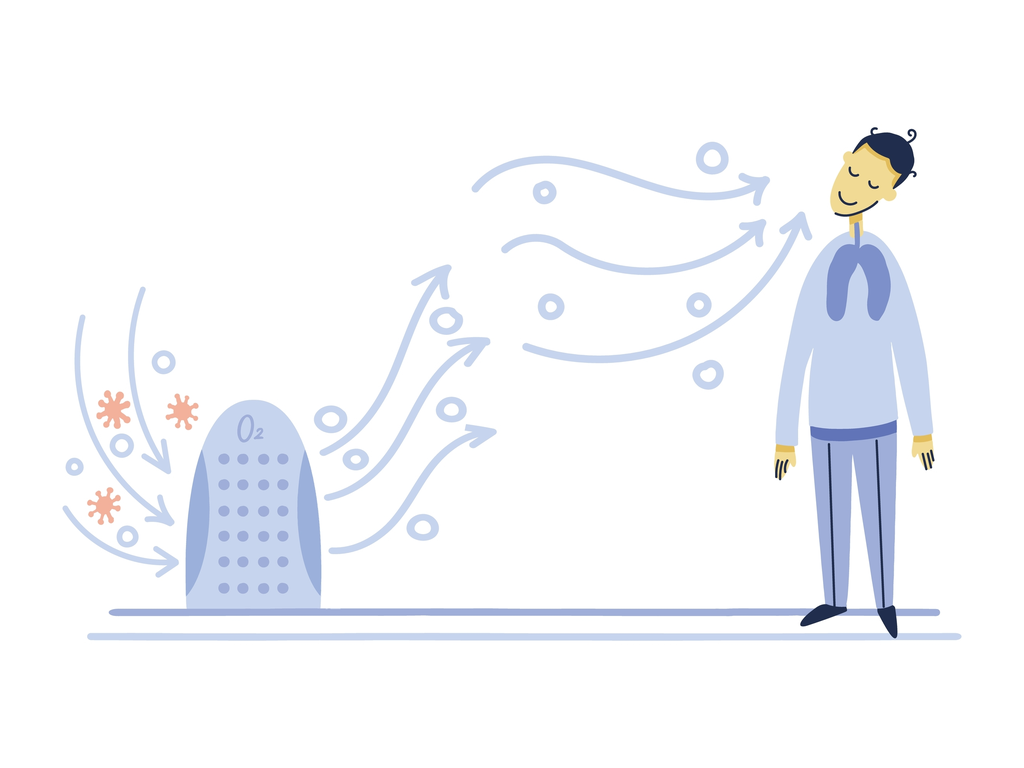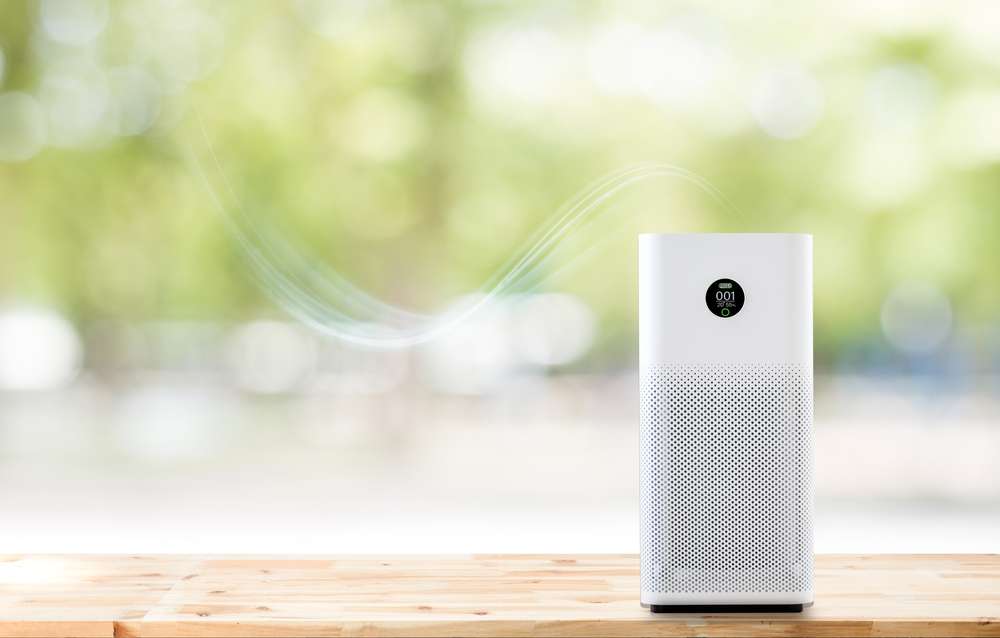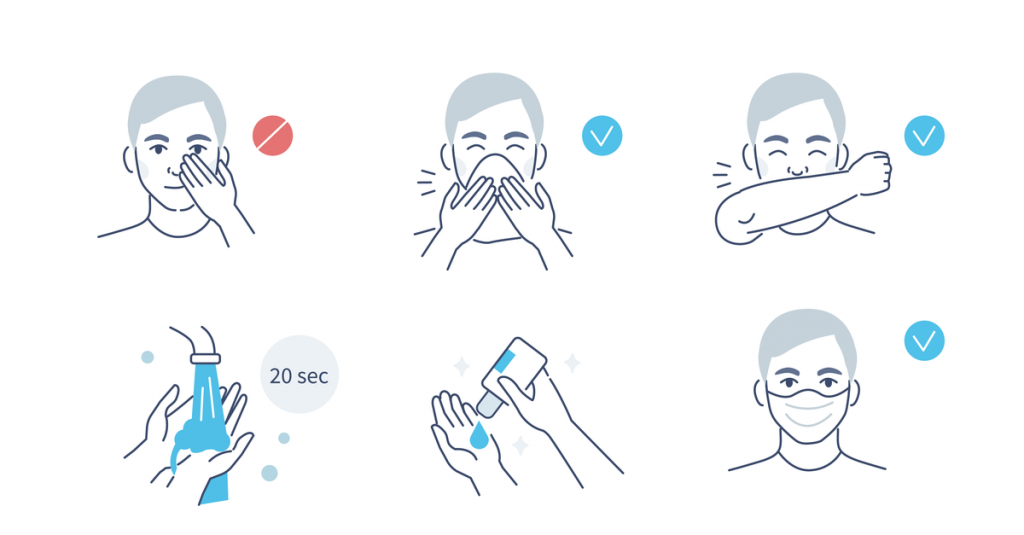COVID has changed our lives. But that doesn’t mean you have to let COVID take control of your life. There are ways to stay safe and still live the life you want. Are air purifiers one of those ways? Do air purifiers help with COVID?
Yes, air purifiers do help remove COVID from the air, but by themselves, they aren’t enough. In order to protect yourself as much as possible from viruses, like COVID, its’ recommended to follow all CDC guidelines. These would be things such as wearing a mask and limiting contact with others, especially those who are sick or recently were sick. Doing all of these things can greatly reduce your likelihood of getting COVID.
Air Purifiers And COVID

How COVID Gets Into The Air
COVID is spread in a couple of ways. It can be spread by touching surfaces where the virus is present, whether due to a cough or sneeze or something else. Most often though, COVID is spread through the air. This can happen in a variety of ways, making air purifiers all the more important to help with its removal.
First, COVID can spread if you’re near a person who is infected. You can become infected if they breathe, speak, sneeze, or cough and you end up inhaling those particles or droplets. This can happen even if you’re 6 feet (1.8 meters) away from someone because COVID doesn’t just go away. Unfortunately, COVID can stick around in the air for hours and will continue to spread through the air. This is why air purifiers are helpful when it comes to COVID.
What Air Purifiers Do
Air purifiers help clean the air inside whatever room or building they’re in. This can be a home, an office, or something else. They do this by getting unwanted particles out of the air. These particles can be things like dander, dust, pollen, bacteria, and also viruses, like COVID.
How Air Purifiers Remove Particles Like COVID From The Air
Filter Air Purifiers
How an air purifier gets these particles out of the air depends on what type of air purifier it is. If it’s a filter air purifier, then it uses one or more filters to trap the particles. If the air purifier’s filter has an activated carbon filter, then the air purifier can also trap some gases. These filters will need to be replaced according to manufacturer recommendations.
Ultraviolet Air Purifiers
Ultraviolet air purifiers use a process called Ultraviolet Germicidal Irradiation or UVGI. This process exposes particles, specifically bacteria and viruses, to a specific kind of UV light. This exposure over time, minutes in some cases, kills those bacteria and germs. Please know that these air purifiers have the potential to create ozone, which is harmful to humans. If you decide to purchase an ultraviolet air purifier, we recommend making sure it has appropriate safeguards in place and following all manufacturer recommendations.
Electrostatic Precipitators And Ionizers
There are also electrostatic precipitators and ionizers. These air purifiers use similar techniques for removing particles from the air. In both cases, the particles coming through those air purifiers are given either a positive or negative charge. Because they have these charges, they end up sticking to sheets of metal called collecting plates, which have the opposite charge, instead of continuing on with the air. These air purifiers also have the potential to create ozone.
Ozone Generators
Don’t use these air purifiers in spaces where people are present or frequent. They create ozone on purpose and are only useful in very specific situations that do not apply to homes, offices, or other places where people go.
Which Air Purifier Is The Best For Removing COVID?
This is a tricky question, and it all comes down to what you’re comfortable with. Let’s start with filter air purifiers. Many filter air purifiers come with true “High-Efficiency Particulate Air”, or HEPA filters, which are the best filter for removing particles from the air. To be considered HEPA, the filter has to be able to remove particles that are, at worst, size 0.3 microns in diameter. They also need to be able to do this 99.7% of the time. For reference, human hair is about 70 microns in diameter.
Now, COVID happens to be about 0.1 microns in size, so how are HEPA filters effective? The same way masks are. Because COVID particles need to attach themselves to larger particles like droplets when someone sneezes, coughs, breathes, or speaks. So, while the HEPA filters can’t stop COVID by itself, they can stop the droplets COVID uses to get to us.
The other possibility is ultraviolet air purifiers. Since they specifically target viruses and bacteria, it would make sense to use one to help improve COVID elimination. They do work, but they take time to do so and because they can create ozone, they may end up causing more harm than good.
Tips To Maximize Air Purifier Effectiveness

Tip #1: Keep Your Air Purifier Running 24/7
To maximize your air purifier’s ability to clean your air, you need to keep it running as long as possible. If you can, keep it running all day every day. That might be confusing because wouldn’t it eventually clean up all the air? Unfortunately, no. There are many ways that particles and gases can get into your home, even with good ventilation and air purifiers, so keep them running as much as you can.
Tip #2: Change The Air Purifier’s Fan Settings
Not every air purifier will have this option but, for those that do, changing how fast the fan runs can increase how much air the air purifier is pulling in. Because particles like COVID can hang around in the air for so long, giving your air purifier more chances to filter that air gives it more chances to remove those particles too.
Tip #3: Get An Air Purifier With Multiple Filters
Whether you decide to go with a filter air purifier or an ultraviolet air purifier, the fact is that the more “filters” the air purifier has to deal with pollutants in the air, the better. Some filter air purifiers, for example, have a pre-filter, the HEPA filter, and an activated carbon filter, which takes care of some gases. There are also some air purifiers that have ultraviolet technology and HEPA filters.
Basically, get an air purifier with multiple filters.
Tip #4: Get A Larger Air Purifier
Larger air purifiers will be more expensive, but it may be worth it to do so. The larger the air purifier the more of the air that it can clean. There are even air purifiers that can purify your whole house, although these will likely require the help of an HVAC technician to install.
What Else You Can Do About COVID

Unfortunately, air purifiers, whether for a room or a whole house, just aren’t enough to keep us safe from COVID. We recommend that you follow all CDC guidelines when it comes to COVID. This includes wearing a mask, washing your hands, quarantining or isolating if you’re sick, and avoiding others who are sick too.
Also, make sure your ventilation is up-to-date and working. Ventilation helps to refresh your indoor air with air from the outside. This, along with air purifiers, can help keep you safe from COVID.
In Conclusion: Do Air Purifiers Help With COVID?
So, do air purifiers help with COVID? Yes, they do, but having an air purifier alone isn’t enough to keep you from getting COVID. You’ll need to follow other CDC guidelines as well as invest in an air purifier to maximize your chances to stay safe.
So, what are you doing to keep safe from COVID? What’s been working best for you? Let us know in the comments below!

